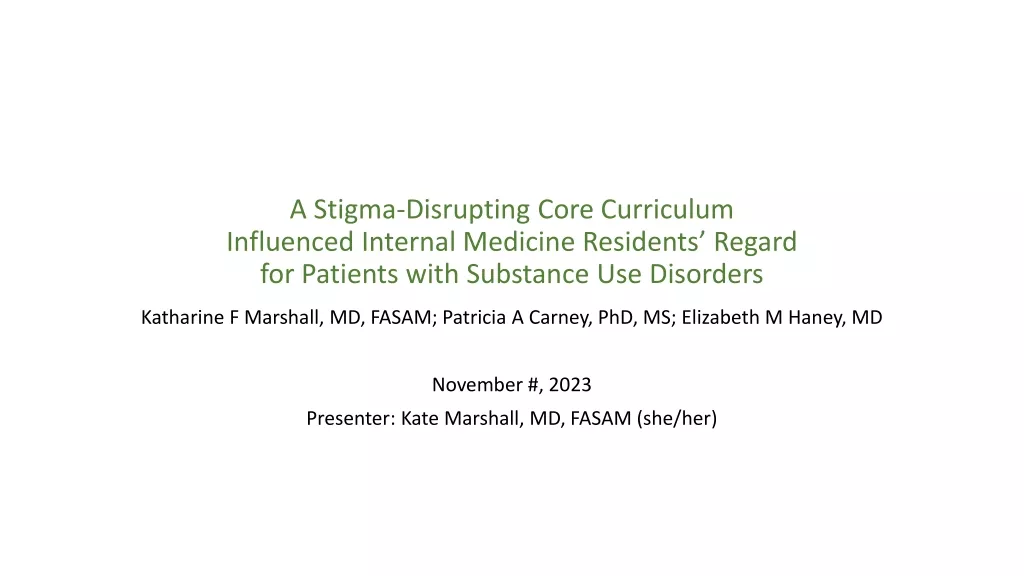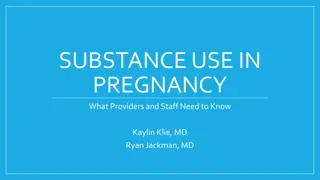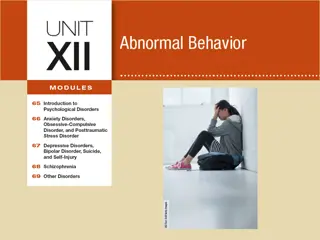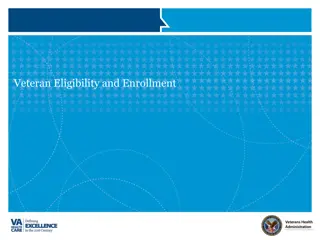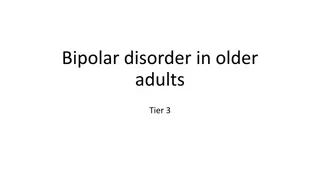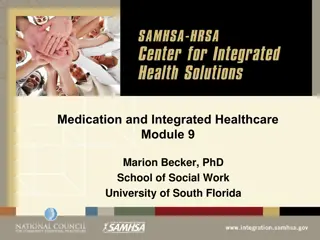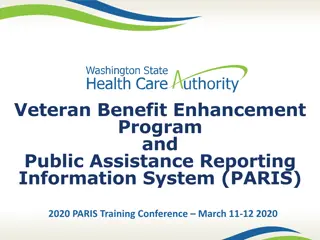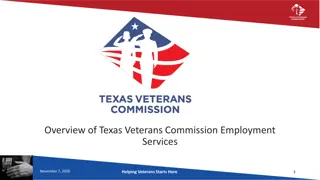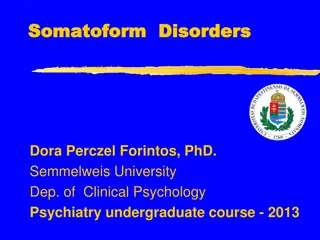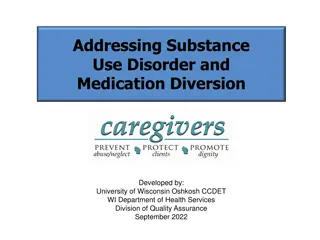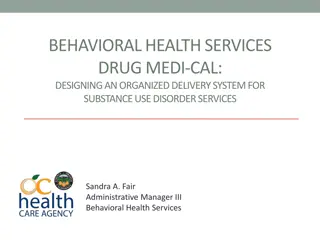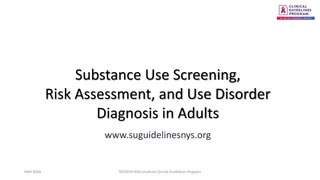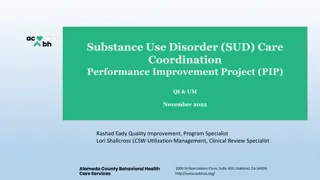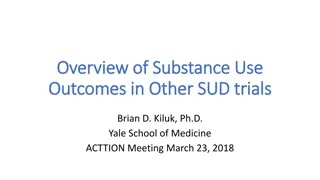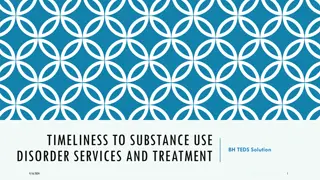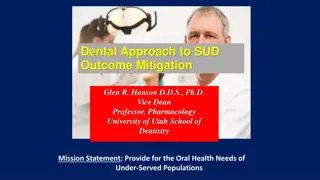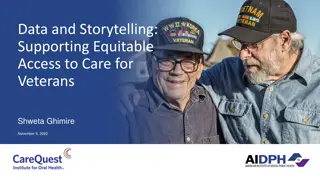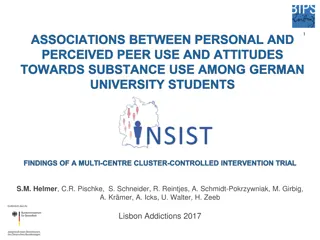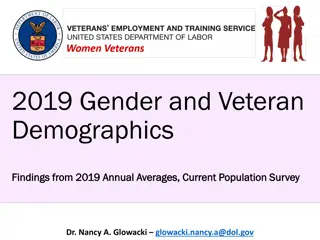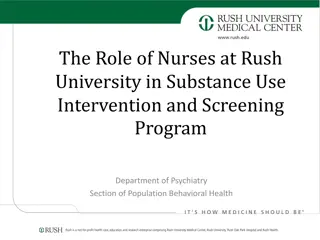Veteran Care and Substance Use Disorder Services in New York State
This overview discusses the importance of recognizing veterans, asking pertinent questions, and providing patient-centered care in addressing substance use disorder services in New York State. The content emphasizes the need to identify veterans, inquire about their military experience, and collaborate with them to make informed treatment decisions.
Download Presentation

Please find below an Image/Link to download the presentation.
The content on the website is provided AS IS for your information and personal use only. It may not be sold, licensed, or shared on other websites without obtaining consent from the author. Download presentation by click this link. If you encounter any issues during the download, it is possible that the publisher has removed the file from their server.
E N D
Presentation Transcript
VA Substance Use Disorder Services in New York State: An Overview ANN FEDER, LCSW VA-VISN 2SOUTH MH PROGRAMS MANAGER BRONX, NEW YORK
First of all..WHO is a Veteran? Veteran: active military, naval, or air service, discharged or released under conditions other than dishonorable. Veterans may be enrolled or not enrolled with VHA. Enrolled Veteran: has applied for health care benefits from the VA health care system. Patient: Not all enrolled Veterans take advantage of their VA health care benefits, but those who do so during some particular time period of interest, are referred to as patients.
Veteran Recognition: Very Important You may be the first healthcare provider contacted by the veteran whether he or she has just returned from Iraq or Afghanistan or served in an earlier era. Asking men and women about their service will help you address the veteran s concerns improve rapport and therapeutic partnerships serve as the basis for timely referral to specialized healthcare resources.
Veteran Recognition: Questions Did you serve in the military? Which branch of the service? Tell me about your military experience. When and where do you/did you serve? What do you/did you do while in the service? How has your military service affected you? * VA Office of Academic Affiliations (2009)
Veteran Recognition: Questions (continued) If "Yes" to any of the previous questions, ask: Can you tell me more about that? Did you see combat, enemy fire, or casualties? Were you wounded, injured, or hospitalized? Did you ever become ill while you were in the service? Were you a prisoner of war? * VA Office of Academic Affiliations (2009)
Patient Centered Care and Shared Decision Making Patient is the expert on his/her life and experience. Elicit preferences and goals Strengths and weaknesses Clinicians are expert on risks-benefits of the full menu of treatment options. Provide easily understandable information for patient to make an informed decision Collaborate to develop treatment goals/objectives/interventions. Assess progress and modify the plan, as indicated.
VAMCs & Community Based Outpatient Clinics (CBOCs) in New York State VA Medical Centers: VISN 2 North Albany Hudson Valley (Montrose & Castle Point) Western New York (Buffalo & Batavia) Bronx (James J. Peters VAMC) Binghamton NY Harbor (Manhattan & Brooklyn) Bath Northport (Long Island) Syracuse VA New Jersey (East Orange & Lyons) VISN 2 South Community Based Outpatient Clinics Across NY State: 31 CBOCs in VISN 2 North 26 CBOCs in VISN 2 South For details: http://www.va.gov/directory/guide/region.asp?map=1&ID=3
VA Substance Abuse Programs in New York State = Substance Abuse Residential Programs = Substance Abuse Outpatient Programs
SUD Treatment in the VA Every VA medical center operates a SUD specialty care program for the treatment of drug and alcohol problems. SUD care includes a broad array of services within SUD specialty clinics as well as in general MH clinics, in Primary Care-MH clinics, in PTSD programs and in our Homeless Programs. In other words: no wrong door for accessing SUD care!
Settings for SUD Care in the VA Non-SUD specialty care SUD services provided in primary care, mental health, PTSD services/teams, etc. Standard outpatient programs Ambulatory SUD services at sites without IOP. Intensive outpatient programs Provide at least three hours of SUD treatment services three days per week. Includes day treatment, partial hospitalization, and intensive outpatient clinic-based programs. Methadone maintenance & Suboxone programs In-House or contracted with community providers. Substance Abuse Residential Rehabilitation Treatment Programs These are dedicated Substance Abuse Residential Rehabilitation Treatment Programs providing Psychosocial treatment. All residential treatment programs within the VA offer some SUD treatment.
SUD Treatment by Location SUD Specialty Care Outpatient Care Ambulatory Alcohol Detox Intensive Outpatient Treatment Standard Outpatient and Aftercare Opiate Treatment (Methadone & Buprenorphine) Inpatient Inpatient Detoxification Services Substance Abuse Residential Rehabilitation and Domiciliary Programs
Enhanced Services Unique to VA Homeless SUD specialist PTSD/SUD Specialist aligned w/either clinic and serving as a liaison. SUD Specialist assigned to general MH & PTSD Residential Rehabilitation Treatment Programs Suicide Prevention Program Access Compensated Work Therapy + SUD monitoring Supported Employment for dually diagnosed patients
Integrating SUD Treatment with Homeless Services Housing First options & harm reduction strategies help some Veterans begin recovery For those willing to engage in SUD treatment, access policies have changed (practices are changing). SUD treatment can be effective over time Screening for relapse risk and safety is an ongoing process for a chronic condition. Attention to SUD is an issue for all providers, not just SUD specialty care.
Other SUD Collaborations Infectious Disease Clinics Pain Clinics Traumatic Brain Injury Clinics Spinal Cord Injury Programs OEF/OIF/OND Programs Women s Programs Use of Vet Centers
Substance Abuse Residential Rehabilitation Programs across NY State Buffalo Albany Montrose (Hudson Valley) Brooklyn (NY Harbor) Northport Domiciliaries for Homeless Veterans: Bath Montrose St Albans (NY Harbor)
Substance Abuse RRTP- Western NY Facility Western NY VA - Buffalo 16 WNY SARRTP is a 20 bed residential unit with 16 beds for men and 4 beds for women, located at the Western New York VA Medical Center. Women are housed on a separate section of the wing and have private bathrooms. The program has a variable length of stay, with most patients choosing a 28 day modality. Extended stay options are available on a case by case basis. The program provides evidence based treatment for substance abuse and co-occurring mental health conditions, including PTSD, depression, anxiety and relapse prevention for addictive disorders. The program offers pharmacotherapy for alcohol and opioid dependence and psychiatric support for mental health concerns. Recreational, alternative medicine, self-help meetings, peer support, music and artistic expression all are provided in a comprehensive, holistic rehabilitation regimen. Many Veterans who complete the program engage in additional residential placements and others choose standard outpatient follow-up care. Veterans must be eligible for VA services, demonstrate medical and psychiatric stability, a willingness to engage in a structured program aimed at substance abuse recovery goals, the ability independently provide for their own self-care, and must meet ASAM placement criteria for residential care Referral sources are asked to fax an updated psychosocial including labs to: Jule Tomm, LMSW, SARRTP Intake Coordinator 716-862-8560 Description: Eligibility Criteria: Referral Process: WNY SARRTP screening team meets on all business days and reviews medical records. Review includes psychiatric, medical, and other psychosocial data. Veterans will be scheduled for a telephone screening. Veterans are advised in writing of admission determination. If declined, alternative recommendations are made. Donna Sherman, LCSW-R Jule Tomm, LMSW Substance Abuse Specialty Services SARRTP Intake Coordinator Program Manager Tel: 718-862-7210 Required Documentatio n for Admission: Point of Contacts/ Alternate Point
SARRTP Albany Albany VA Health Care System Facility Description: Albany SARRTP is a 12-bed residential unit that serves both men and women. The program is approximately five weeks, though lengths of stay vary based on each individual Veteran s needs. Veterans participate in psychoeducation and process groups, adventure based learning, individual psychotherapy, yoga, music therapy, recreation activities, trauma assessment and treatment, peer support groups, 12-step meetings, and healthy living education. Upon successful completion of the program, Veterans transition into aftercare through the outpatient substance use disorder program or transition into another residential program to provide additional treatment, such as PTSD residential care or long term substance use disorder programming. 17 Eligibility Criteria: Veterans who are eligible for VA care and who meet ASAM criteria at the residential care level based on an intake screening. Veterans must be medically and psychiatrically stable within the scope of services provided, capable of self-preservation, and able to independently manage activities of daily living. Contact Intake Coordinator Terri Trendell, RN, at 518-626-5361 or contact Centralized Scheduling to schedule a CDRP Screening at 518-626-5386 Referral Process: Required Documentatio n for Admission: Intake screening by a program clinician and a review of recent medical records by the program medical provider Devon Cummings, PhD Terri Trendell, RN SARRTP Program Manager SARRTP Intake Coordinator Email: Devon.Cummings@va.gov Terri.Trendell@va.gov Phone: 518-626-5394 518-626-5361 Point of Contacts/ Alternate Point of Contact: Fax: 518-626-5381
SARRTP Hudson Valley (Montrose) Facility Hudson Valley Health Care System Description: Substance Abuse Domiciliary: The philosophy of the SA DOM is that the abuse of drugs is a complex issue, affected by the genetic, biological, social and psychological factors coupled with an inability to cope effectively with one s emotions. Through a cognitive-behavioral approach and harm reduction model to chemical dependency, utilizing paper and pencil exercises, individual sessions, group sessions, didactic groups, motivational interviewing, seeking safety groups and other services, the resident becomes better equipped to cope with the daily battle of substance abuse. 18 Eligibility Criteria: Primary diagnosis of Substance Abuse/Dependency may also have other Axis I, II, and III diagnoses. Alcohol free at time of admission and if not will be referred for appropriate services. Veterans psychiatric symptoms would not prevent active and appropriate participation in the program. No current medical problems that will prevent active participation in the program. Veteran must be independent in activities of daily living. Must be willing to sign resident contract, including a waiver of ongoing gender-neutral random, scheduled and clinical provider requested drug/urine screens. An assessment that a level of care greater than outpatient services is needed. No legal problems that will prevent active participation in the program. Must be willing and able to work with the team and to understand and comply with the treatment plan and the program rules, regulations and structure. Contact (914) 737-4400 ext. 2747 for referral information Referral Process: Required Documentation for Admission: If the veteran is from VISN 2 South, then no documentation is necessary. Point of Contacts/ Alternates Gregory Mack, PhD Phone : (914) 737-4400 ext. 2418 Fax : (914)788-4263 Fax: (914) 788-4263 Email : Gregory.Mack@va.gov Sophia Parker, LCSW (914) 737-4400 ext.2747 Sophia.Parker@va.gov
SARRTP - Brooklyn Facility New York Harbor Health Care System- Brooklyn Campus SUBSTANCE ABUSE RESIDENTIAL TREATMENT PROGRAM. Provides 24 hours-per-day, residential level of care to Veterans with SUD. Structured 21 days length of stay and individualized stay to meet Veterans needs. Not a substitute for housing and/or lodging. Description: Veteran must be eligible for VA hospital care. Both male and female Veterans are accepted. Medically and psychiatrically stable within the scope of services provided Capable of self preservation and managing basic self care independently Contact Zabatta John RN at (718) 836-6600 ext: 4093 or the Inpatient Secretary Desk @ (718) 836-6600 ext: 6754 Eligibility Criteria: Referral Process: Required Documentation for Admission: Medical Clearance (Health screening) Interfacility Consult Application Screening by program clinician Point of Contacts/ Alternate Point of Contact: Hermelinda Robinson, RN ,PCTC Phone: (718) 836-6600 ext: 6754 Dr. Towey Eldene Medical Director ext: 3086
Substance Abuse RRTP Northport 20 Facility Northport VA Medical Center Substance Abuse Residential Rehabilitation Treatment Program (SARRTP): SARRTP is a 30 bed residential unit, and patients average length of care is 3-5 months. Veterans attend psychotherapy groups and psycho educational programs (i.e., Early Recovery, Anger Management, Positive Relationships, and Relapse Prevention) and bi-monthly individual psychotherapy appointments. There are multiple recovery meetings on & off the unit each week, and attendance is required. Veterans participate in a work therapy assignment up to four days per week, and vocational rehabilitation services are provided during the course of treatment. Upon successful completion of the program, veterans are assisted with transitioning into the community, which involves the opportunity to live in a sober house for Veterans where other former SARRTP residents are staying who continue with recovery activities. Admission Criteria: Veteran is referred by a clinician who has completed an application package. Clinician should be able to validate veteran s appropriateness for the program. 1. Veteran is eligible for treatment at the Northport VAMC. 2. Veteran s primary diagnosis is Alcohol and/or Substance Dependence. 3. Veteran is not currently in need of an intensive substance abuse treatment program. 4. Veteran demonstrates motivation and ability to remain abstinent. 5. Veteran is able to participate in a work therapy assignment and demonstrates motivation and ability to return to competitive employment. 6. Veteran can function appropriately in a supervised group living situation. 7. Veteran has no ongoing legal involvement that would significantly interfere with residence activities. If on probation or parole, veteran gives permission for contact with the P.O. 8. Veteran is not dangerous to self or others. 9. Veteran has agreed to and signed the Contract and furthermore agrees to abide by all program rules and regulations. *The program is designed for both male and female veterans. Description: Eligibility Criteria: Continued on the next page
Substance Abuse RRTP- Northport (continued) 21 Facility Northport VA Medical Center A referring clinician can fax a completed application to the Psychology Service (116B) fax number (631-266-6086) with the attention to Erin Kode. A completed application can also be mailed to: Referral Process: Northport VAMC Psychology Service (116B) Attn: Erin Kode 79 Middleville Road Northport, NY 11768 If there are any questions, please call Erin at (631) 261-4400, ext. 6795. Upon receiving the application, an in-person screening appointment will be scheduled. If the person is currently in treatment at another facility, alternative arrangements can be made (e.g., phone screening). Required Documentation for Admission: Please see attached SARRTP application. (Click on attachment) Dr. Erin Kode, Psy.D. Dr. Janet Eschen, Ph.D. SARRTP Screenings SARRTP Coordinator Email: Erin.Blasdel@va.gov Janet.Eschen@va.gov Phone: (631) 261-4400 ext. 6795 (631) 261-4400 ext.5665 Fax: (631) 266-6086 Fax: (631) 266- 6086 Point of Contacts/ Alternate Point of Contact:
Specialty Populations Operation Enduring Freedom/Operation Iraqi Freedom/Operation New Dawn Veterans 33,016 Iraq/Afghanistan Veterans have been treated in Upstate NY; 42, 468 treated in Downstate NY & NJ. This equates to 7% of all Returning Veterans who have sought VA care. Nationwide: 12% received a dx of Alcohol Dependence Syndrome, 10% diagnosed w/non-dependent abuse of drugs & 7% w/Drug Dependence Women Veterans 66,052 Women Veterans in NY State; Women make up 11.6% of OEF/OIF/OND Veterans. All SUD Programs are open to Female Veterans; some chose to attend specialized Women s Treatment Units (1 in Buffalo and 1 in VA New Jersey) Source: Environmental Epidemiology Service Office of Public Health and Environmental Hazards Department of Veterans Affairs
Resources & Further Information http://www.mentalhealth.va.gov/substanceabuse.asp http://www.va.gov/directory/guide/state_SUD.cfm? STATE=NY www.healthquality.va.gov www.nynj.va.gov www.visn2.va.gov Ann Feder, LCSW Ann.feder@va.gov 718-584-9000 x3719
Questions? Thank you!
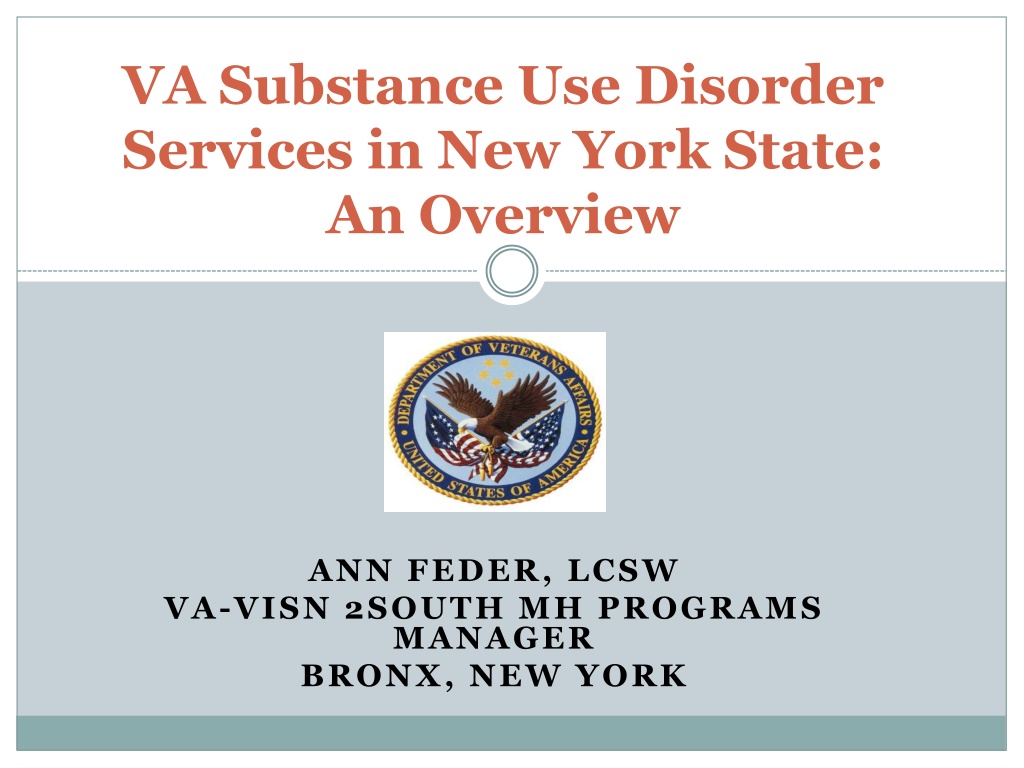
 undefined
undefined











